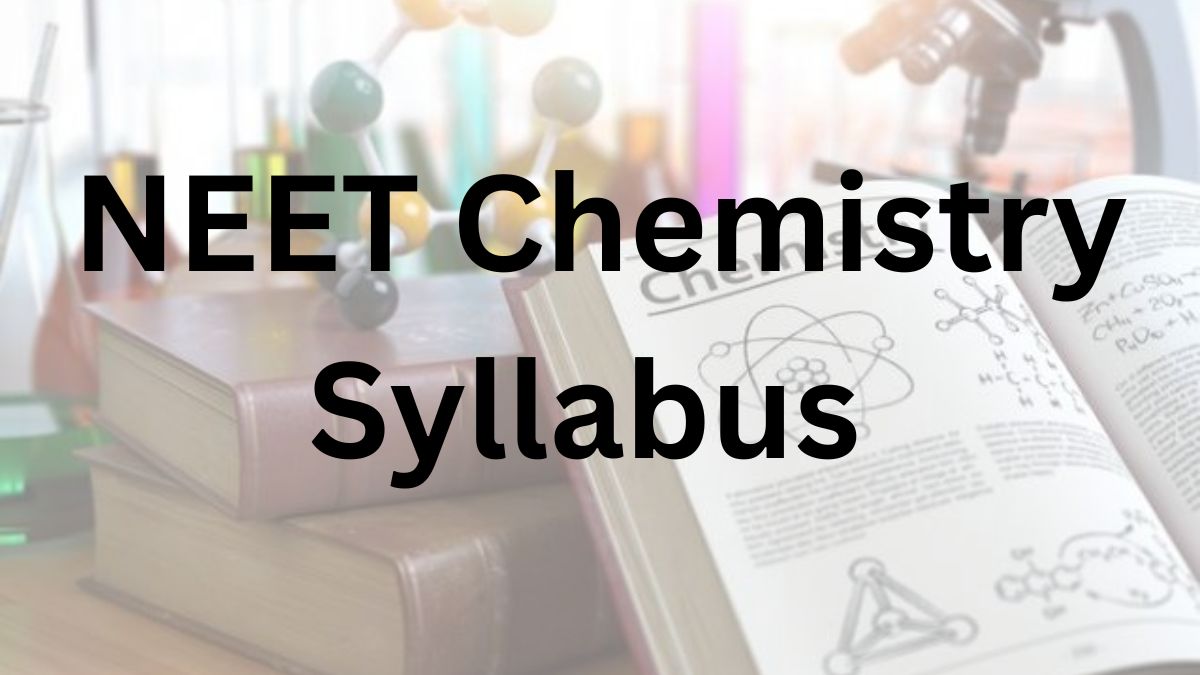The National Medical Commission is all set to release the latest and updated NEET Exam Syllabus 2026. All the students must now start preparing for the exam. Chemistry is one of the main subjects that needs to be covered by students in the process of completing their preparations for the exam. Hence, we will also share the NEET Chemistry Syllabus 2026 in the article below.
Aspirants are suggested to cover all the important topics mentioned in the NCERT textbooks of class 11th and class 12th, as the major portion of the NEET Chemistry Syllabus 2026 comprises of the important topics from the chemistry syllabus of classes 11th and 12th.
NEET Chemistry Syllabus 2026 Out
Medical students preparing for NEET 2026 need to understand the updated Chemistry syllabus, which includes Organic, Inorganic, and Physical Chemistry, based on Class 11th and 12th NCERT books. Key topics are atomic structure, chemical reactions, thermodynamics, and biomolecules.
Starting early is crucial for better preparation. It helps students understand the syllabus, exam pattern, and important concepts in detail. Early planning also provides enough time to solve sample papers and previous years’ questions, improving confidence and problem-solving skills. Regular practice and timely preparation make it easier to identify strengths and weaknesses, ensuring steady progress.
NEET 2026 Chemistry Syllabus
The NEET Chemistry syllabus includes topics from both Class 11 and 12. Class 11 covers basic concepts like atoms, chemical bonding, states of matter, heat, and the periodic table. Class 12 has more advanced topics such as solids, solutions, electrochemistry, chemical reactions, and organic chemistry.
The syllabus is divided into three parts: organic, inorganic, and physical chemistry. This makes it easier for students to study each section separately. Both Class 11 and 12 topics are equally important for the exam. A strong understanding of all concepts helps in scoring well. Proper preparation and practice can improve performance in the NEET Chemistry section.
| NEET 2026 Chemistry Syllabus | |
| Physical Chemistry | |
| 1 | Some Basic Concepts in Chemistry |
| 2 | Atomic Structure |
| 3 | Chemical Bonding and Molecular Structure |
| 4 | Chemical Thermodynamics |
| 5 | Solutions |
| 6 | Equilibrium |
| 7 | Redox Reaction and ElectroChemistry |
| 8 | Chemical Kinetics |
| Inorganic Chemistry | |
| 8 | Classification of Elements and Periodicity in Properties |
| 10 | P-Block Elements |
| 11 | d- and f- Block Elements |
| 12 | Coordination Compounds |
| Organic Chemistry | |
| 13 | Purification and Characterisation of Organic Compounds |
| 114 | Some Basic Principles of Organic Chemistry |
| 15 | Hydrocarbons |
| 16 | Organic Compounds Containing Halogens |
| 17 | Organic Compounds Containing Oxygen |
| 18 | Organic Compounds Containing Nitrogen |
| 19 | Biomolecules |
| 20 | Principles Related to Practical Chemistry |
NEET 2026 Chemistry Syllabus PDF
The newly updated NEET 2026 Chemistry syllabus will be available soon with some changes. Some new topics have been added, a few have been removed, and others have been changed. The syllabus is now shown in a table format to make it easier to understand. Students should check the new syllabus carefully to see what to study and what has been removed. Following the latest syllabus is very important to prepare well and score high in NEET 2026. Focus more on the revised topics and avoid studying extra chapters that are no longer needed. A direct link to download the updated Chemistry syllabus will be shared in the article below.
NEET Chemistry Syllabus 2026 Chapter-Wise Topics
As per the current revision, the newly added topics in the NEET Syllabus 2026 for Chemistry include many topics beyond what is found in the NCERT Chemistry textbooks for classes 11 and 12. Students preparing for NEET should also use other study materials and older NCERT textbooks to fully understand these topics.
This extra study can help them grasp important concepts that may not be included in the current textbooks. By exploring a variety of resources, students can better prepare for the exam and increase their chances of success. It’s important to be well-rounded in their knowledge of chemistry to do well on the NEET exam.
| NEET Chemistry Syllabus 2026 Chapter-Wise Topics | |
| Unit name | Added topics in NEET Chemistry Syllabus 2026 |
| Atomic Structure | Nature of electromagnetic radiation, photoelectric effect; Spectrum of the hydrogen atom. Bohr model of a hydrogen atom – its postulates, derivation of the relations for the energy of the electron and radii of the different orbits, limitations of Bohr’s model |
| Chemical Bonding and Molecular Structure | Kossel – Lewis approach to chemical bond formation, the concept of ionic and covalent bonds, Elementary idea of metallic bonding, Fajan’s rule |
| Chemical Thermodynamics | Fundamentals of thermodynamics: System and surroundings, extensive and intensive properties’ state functions, types of processes |
| Redox Reactions and Electrochemistry | Electrolytic and metallic conduction, conductance and their in electrolytic solutions, molar conductivities variation with concentration: Kohlrausch’s law and its applications
Electrochemical cells – Electrolytic and Galvanic cells, different types of electrodes, electrode potentials including standard electrode potential, half-cell and cell reactions, emf of a Galvanic Cell and its measurement: Nernst equation and its applications, Relationship between cell potential and Gibbs’ energy change: Dry cell and lead accumulator, Fuel cells |
| Chemical Kinetics | Pressure, collision theory of bimolecular gaseous reactions (no derivation) |
| d and f Block Elements | Transition Elements |
| Purification and Characterization of Organic Compounds | Purification – Crystallisation. sublimation, distillation, differential extraction, chromatography – principles and their applications
Qualitative analysis – Detection of nitrogen, sulphur, phosphorus, and halogens Quantitative analysis (basic principles only) – Estimation of carbon. hydrogen. nitrogen. halogens. sulphur. phosphorus. Calculations of empirical formula and molecular formulae: Numerical problems in organic quantitative analysis |
| Hydrocarbons | Classification of isomerism. IUPAC nomenclature, general methods of preparation, properties, and reactions |
| Organic Compounds Containing Halogens | General methods of preparation, properties, and reactions; Nature of C-X bond: Mechanisms of substitution reactions
Uses; Environmental effects of chloroform, iodoform freons, and DDT |
| Principles Related to Practical Chemistry | Detection of extra elements (Nitrogen, sulphur, halogens), in organic compounds; Detection of the following functional group, hydroxyl (alcoholic and phenolic), carbonyl (aldehyde and ketones) carboxyl, and amino groups in organic compounds.
The chemistry involved in the preparation of the following: Inorganic compounds: Mohr’s salt. potash alum Organic compounds: Acetanilide. p-nitro acetanilide, aniline yellow, iodoform The chemistry involved in the titrimetric exercises – Acids. bases and the use of indicators. oxalic-acid vs KMnO4. Mohr’s salt vs KMnO4 Chemical principles involved in the qualitative salt analysis |
NTA NEET 2026 New Topics in the Chemistry Syllabus
The following two new topics have been added to the NEET Chemistry Syllabus 2026, which are not included in the current version of the NCERT Chemistry textbooks.
- P-Block Elements: This particular chapter has been deleted from the Chemistry syllabus of NCERT, but has now been included in the NEET UG 2026 syllabus.
- Experimental-based Chemistry: The revised syllabus also comprises experimental-based topics in Chemistry, which include the detection of functional groups like hydroxyl and carbonyl, along with inorganic compounds such as Mohr’s salt and potash alum.
Deleted topics in the NEET 2026 Chemistry Syllabus
The National Medical Commission (NMC) has streamlined some parts of the chapters in the NEET Chemistry Syllabus 2026, however, the rationale behind the revisions is not disclosed. Only some topics in specific chapters have been removed by the authorities, instead of neglecting whole chapters. The important thing to note is that the p-block chapter, which has been removed recently from the NCERT textbook, is included now in the latest NEET Chemistry Syllabus 2026. Therefore, candidates are advised to refer previous year’s NCERT textbooks to cover these new chapters.
| NEET 2026 Chemistry Syllabus: Deleted Topics | |
| Unit name | Deleted topics in NEET Chemistry Syllabus 2026 |
| Some Basic Concepts of Chemistry | General Introduction: Important and scope of chemistry |
| Atomic Structure | Atomic numbers, isotopes, and isobars. Concept of shells and subshells, dual nature of light |
| Chemical Thermodynamics | Third law of thermodynamics- Brief introduction |
| Some p-Block Elements | Atomic number, isotopes, and isobars, Concept of shells and subshells, dual nature of matter and light |
| Organic Compounds Containing Nitrogen | Cyanides and Isocyanides- will be mentioned at relevant places |
| Environmental Chemistry | Environmental pollution: Air, water, and soil pollution, chemical reactions in the atmosphere, smogs, major atmospheric pollutants; acid rain ozone and its reactions, effects of depletion of the ozone layer, greenhouse effect, and global warming-pollution due to industrial wastes; green chemistry as an alternative tool for reducing pollution, strategy for control of environmental pollution. |
| Polymers | Classification- Natural and synthetic, methods of polymerization (addition and condensation), copolymerization. Some important polymers: are natural and synthetic like polyesters, bakelite; rubber, and Biodegradable and non-biodegradable polymers. |
| Chemistry in Everyday Life | Chemicals in medicines- analgesics, tranquilizers, antiseptics, disinfectants, antimicrobials, antifertility drugs, antibiotics, antacids, antihistamines.
Chemicals in food- preservatives, artificial sweetening agents, elementary ideas of antioxidants. Cleansing agents- soaps and detergents, cleansing action |
NEET Chemistry Syllabus 2026 Chapter-Wise Weightage
The Candidates planning to appear for the NEET 2026 Examination are advised to carefully go through the chapter-wise weightage of each subject in the NEET 2026 Examination. Chapter-wise weightage is a useful study tool for NEET 2026 preparation. It helps students prioritize their time and focus on topics that carry more weight in the exam. By allocating more time to high-weightage chapters, students can enhance their chances of scoring well.
NEET 2026 Inorganic Chemistry Chapter Wise Weightage
Below we have tabularised the NEET Inorganic Chemistry syllabus which includes all the topics from class 11th and 12th with the number of questions asked from each chapter and their weightage in the NEET Examination.
| Class XI – Inorganic Chemistry – 22% | ||
|---|---|---|
| Inorganic Chemistry NEET syllabus | Inorganic Chemistry Neet syllabus Number of Questions | NEET Inorganic Chemistry Chapter-wise Weightage in % |
| Chemical Bonding | 4 | 9% |
| P-Block Elements | 3 | 7% |
| Periodic Table & Periodicity in Properties | 2 | 4% |
| Hydrogen | 1 | 2% |
| S-Block Elements | 1 | 3% |
| Class XII – Inorganic Chemistry – 12% | ||
| Coordination Compounds | 3 | 6% |
| D and F-Block Elements | 2 | 4% |
| Metallurgy | 1 | 2% |
| Qualitative Analysis | 1 | 2% |
NEET 2026 Organic Chemistry Chapter Wise Weightage
Below we have tabularized the NEET Organic Chemistry syllabus, which includes all the topics from class 11th and 12th with the number of questions asked from each chapter and their weightage in the NEET Examination.
| Class XI – Organic Chemistry – 8% | ||
|---|---|---|
| Organic Chemistry NEET syllabus | Organic Chemistry NEET syllabus Number of Questions | NEET Organic Chemistry Chapter-wise Weightage in % |
| Hydrocarbons | 2 | 4% |
| General Organic Chemistry | 2 | 5% |
| Class XII – Organic Chemistry – 26% | ||
| Haloalkane | 1 | 2% |
| Aldehydes, Ketones, and Carboxylic Acids | 2 | 3% |
| Polymer | 1 | 2% |
| Alcohol, Phenol, Alkyl Halide | 2 | 4% |
| Aromatic Compounds | 3 | 6% |
| Biomolecules | 2 | 4% |
| Carbonyl Compounds | 2 | 4% |
| Organic Compounds Comprising Nitrogen | 2 | 3% |
| Chemistry in Everyday Life | 2 | 3% |
| Environmental Chemistry | 1 | 2% |
| IUPAC & Isomerism | 2 | 4% |
| Practical Organic Chemistry | 1 | 2% |
NEET 2026 Physical Chemistry Chapter Wise Weightage
Below we have tabularized the NEET Physical Chemistry syllabus, which includes all the topics from class 11th and 12th with the number of questions asked from each chapter and their weightage in the NEET Examination.
| Class XI – Physical Chemistry – 17% | ||
|---|---|---|
| NEET Physical Chemistry Class XI Chapters | Physical Chemistry Chapter NEET Average Number of Questions | NEET Physical Chemistry Chapter-wise Weightage |
| Mole Concept | 2 | 5% |
| Atomic Structure & Nuclear Chemistry | 1 | 3% |
| Gaseous State | 1 | 3% |
| Thermodynamics & Thermochemistry | 1 | 3% |
| Chemical Equilibrium | 1 | 3% |
| Ionic Equilibrium | 2 | 4% |
| Redox Reactions | 1 | 2% |
| Class XII – Physical Chemistry – 15% | ||
| Solid State | 1 | 3% |
| Solutions & Colligative Properties | 2 | 4% |
| Electrochemistry | 1 | 3% |
| Chemical Kinetics | 2 | 4% |
| Surface Chemistry | 1 | 2% |
NEET 2026 Chemistry: Important Books
For NEET 2026 Chemistry, focus on the NCERT textbooks, which cover all the important concepts thoroughly. For a deeper understanding, use “Physical Chemistry” by O.P. Tandon and “Concise Inorganic Chemistry” by J.D. Lee. These books break down complex topics into simpler parts, making it easier to understand key ideas. Additionally, there are other useful books for NEET 2026 Chemistry that can help. Combining the NCERT books with these extra resources will give you a strong grasp of chemistry and improve your problem-solving skills, preparing you well for the chemistry section of the NEET 2026 exam.
| NEET 2026 Chemistry: Important Books | |
| Name of the book | Author |
| Physical Chemistry | O P Tandon |
| Oxford’s Organic Chemistry | Jonathan Clayden, Nick Greeves |
| Concise Inorganic Chemistry | J D Lee |
| MTG’s Objective NCERT at your fingertips | MTG Editorial Board |
| Modern’s ABC of Chemistry of Classes 11 and 12 (volumes 1 and 2) | S.P. Jauhar |
NEET 2026 Chemistry: Preparation Tips
All the students planning to appear for the National Eligibility cum Entrance Test [NEET] 2026 are advised to go through the preparation tips discussed below.
- Familiarize yourself with the NEET 2026 Chemistry syllabus. It includes topics from both class 11th and 12th NCERT Textbooks.
- Thoroughly study the NCERT Textbooks. Most of the NEET questions are directly or indirectly based on NCERT content.
- Plan a realistic study schedule that covers all subjects. Allocate time based on your strengths and weaknesses.
- Focus on understanding concepts rather than rote memorization. Strong foundational knowledge is crucial for solving complex problems.
- Keep a list of important formulas and practice their derivations and applications.
- Solve sample papers, and previous year’s question papers, and take mock tests to improve time management and enhance problem-solving skills.
- Solve as many numerical problems as possible. Practice questions from previous year’s papers and mock tests.
- Understand the mechanisms of organic reactions rather than just memorizing them.







 NEET 2026 Syllabus: Subject-Wise Topics,...
NEET 2026 Syllabus: Subject-Wise Topics,...
 NEET PG Scorecard 2025 Out, Check Direct...
NEET PG Scorecard 2025 Out, Check Direct...
 NEET Round 1 Seat Allotment 2025 Release...
NEET Round 1 Seat Allotment 2025 Release...







